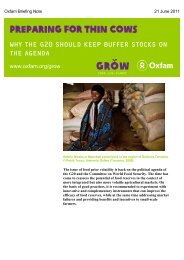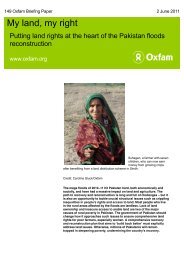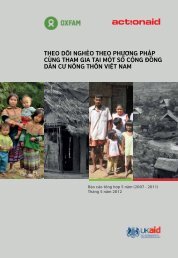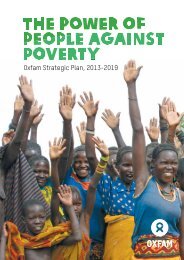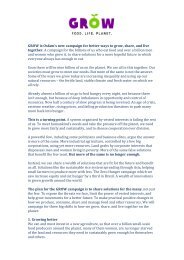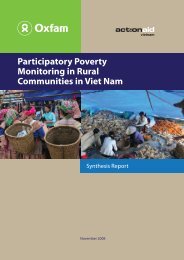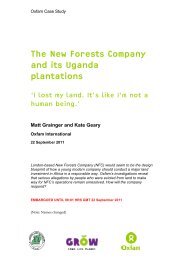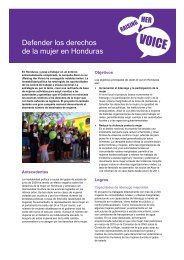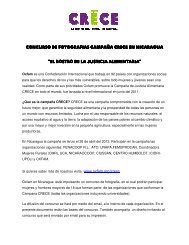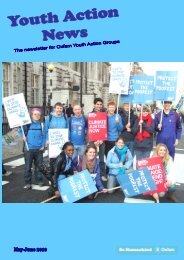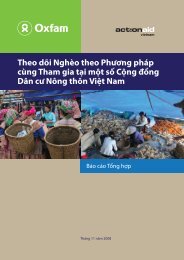Untitled - Oxfam Blogs
Untitled - Oxfam Blogs
Untitled - Oxfam Blogs
Create successful ePaper yourself
Turn your PDF publications into a flip-book with our unique Google optimized e-Paper software.
Impacts of Price Hikes<br />
on the Life and Livelihoods<br />
of the Urban Poor<br />
Table 4.2: Reaction of migrant workers to rising cost of living (%)<br />
Hai Phong Go Vap District Average<br />
cut rent 16.7 5.1 9.9<br />
cut personal savings 21.4 28.8 25.7<br />
cut clothing expenditure 78.6 62.7 69.3<br />
cut entertainment expenditure 69.0 72.9 71.3<br />
cut wedding/funeral expenditure 33.3 22.0 26.7<br />
cut daily food expenditure 33.3 64.4 51.5<br />
cut other personal expenses 66.7 30.5 45.5<br />
cut remittances 28.6 21.2 25.0<br />
Source: Questionnaire survey of 120 migrant workers in Hai Phong and HCMC (June-July 2008)<br />
Many migrants now eat food left over from the evening before or instant noodles for breakfast. Some simply<br />
skip breakfast. They eat lunch at the workplace and try share dinner with other workers in same lodging.<br />
“Even the price of instant noodles has gone up. Last year, it was 1,000 VND. It is now twice<br />
as much. That’s the cheapest noodle I am talking about. Normally there is only one price<br />
increased at the beginning of every year. This year there have been two increases. Electricity<br />
rates have also gone up from 2,500 VND/unit to 3,000 VND/unit.”<br />
“With the same salary we can’t afford to the same level of food expenditure. Last year the<br />
four of us shared a meal of only 20,000 VND. This year we spend the same but have to cut<br />
down on meat. Last year we bought 0.2 kg of meat for each meal. This year we only get 0.1<br />
kg and this is meat of lower quality also. The lunch at the workplace is obviously worse as<br />
well in terms of quality”.<br />
(Discussion with migrant workers group in ward 6, Go Vap district, HCMC, July 2008).<br />
A number of migrant workers in HCMC have had to move to new lodgings further from work, located in<br />
suburban areas where infrastructure facilities are worse, yet the rental is lower.<br />
“Last year, I rented lodging near the company where I worked. However, the rent is now<br />
800,000 VND/month. I can only earn 300 million VND/month (inclusive of overtime<br />
payments). Last year I spent only 350,000/month on food. This year, it’s 600,000 VND and<br />
the food is not as good. I also have to send back home the same amount of money - 500,000<br />
VND/month - in order to pay for my brother’s school fees.<br />
Three friends of mine and I have had to move here to save some money. The lodging is now<br />
three km from the company and it is very small, only 10 m 2 . It is very warm inside. The<br />
bathroom is not clean. The water smells so we have filter it before drinking it. Thefts are also<br />
very common in this area. There are also a lot drinkers living nearby. They drink and shout.<br />
Sometimes we cannot sleep because of the noise. It is very unpleasant living here. However<br />
we have not been able to find an alternative place rents are very high. We pay only 450,000<br />
VND/month here. Well, we can’t do much now”.<br />
(L.T. L. H., 20, migrant worker in ward 17, Go Vap district, HCMC, July 2008)<br />
Their personal savings and remittances have also been greatly affected. A quarter of the workers<br />
interviewed have had to reduce both personal savings and remittances.<br />
“My monthly salary is 1.4 million VND. In 2007 I was able to save as much as 500,000 VND.<br />
This year I cannot. A simple example: last year I could buy sticky rice for 1,000 VND. This<br />
year it is 2,000 VND. Everything has become more expensive”.<br />
(Discussion with migrant workers in Niem Nghia ward, Le Chan, Hai Phong, July 2008)<br />
61



